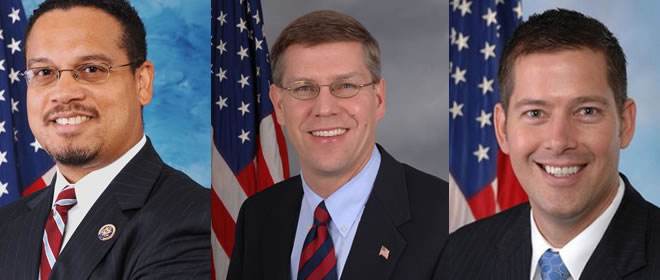
From left, Reps. Keith Ellison (D-MN), Erik Paulsen (R-MN), and Sean Duffy (R-WI)
Thursday, October 09, 2014
By Daniel L. Glaser
Each year millions of Americans use money services businesses (MSBs) to pay bills, cash checks, exchange currency, and send funds to family members and friends. Both domestically and abroad, money transmitters, one type of MSB, also serve the unbanked and under-banked. Ensuring that money transmitters continue to be able to send funds through legitimate and transparent channels requires an approach that balances the complementary goals of financial inclusion and financial transparency.
Money transmitters and remittances play an essential role in financial inclusion; over one-quarter of U.S. households use non-bank financial institutions, including money transmitters.
Yet, money transmitters can also be vulnerable to abuse by money launderers and terrorist financiers. There have been a number of enforcement actions against money transmitters for the movement of drug trafficking, fraud, and human trafficking proceeds. There is also a long history of terrorist financing that has occurred via money transmitters.
In our effort to foster financial inclusion and combat money laundering and terrorist financing, Treasury has led inter-governmental efforts over the last 15 years to establish domestic and international standards for the regulation and supervision of money transmitters. Our efforts have helped create international standards and a domestic regulatory framework that protect consumers, expand financial access, and curtail money transmitter abuse by criminal actors and terrorist financiers. Due to these efforts, record volumes of remittances are being transmitted through legitimate and transparent channels.
We take seriously concerns that some money transmitters are having difficulty obtaining or maintaining bank accounts and that some banks are no longer providing banking services to money transmitters, regardless of risk. Such a development can erode both financial inclusion and financial transparency and work against the efficiency of financial systems.
To address these concerns, Treasury will continue to actively reach out and provide guidance to the private sector. We have conducted extensive outreach to money transmitters and the communities they serve to explain anti-money laundering/counter-terrorist financing (AML/CFT) obligations. We have also conducted outreach to banks to reiterate that providing services to a wide range of MSBs – even those deemed high-risk – is possible while still remaining in compliance with the Bank Secrecy Act. Additionally, we have worked with state governments to help achieve greater transparency and consistent oversight of the industry. It is our view that financial institutions that establish and maintain appropriate risk-based anti-money laundering controls and compliance programs will be well-positioned to appropriately manage such accounts, prevent illicit transactions and avoid enforcement actions.
In August, the President signed the "Money Remittances Improvement Act of 2014." This legislation should improve the oversight of money transmitters by explicitly allowing the Financial Crimes Enforcement Network (FinCEN), and the IRS, to rely on examinations by states of these institutions. This, in turn, should allow for better allocation of state and federal resources, better targeting of higher risk MSBs, and improved AML/CFT compliance across the industry.
Moving forward, we at Treasury see four essential components necessary to improve the banking access of money transmitters: improve the clarity of our expectations for banks, strengthen money transmitter AML/CFT controls and compliance, further enhance money transmitter AML/CFT oversight, and continue ongoing outreach to financial institutions and the customers they serve.
Treasury is working with the federal banking agencies to update guidance to make clear that banks should not be treating all money transmitters as high-risk and that with sufficient controls, banks can effectively manage high-risk money transmitters.
To that end, we are working bilaterally – such as our recent meetings with United Kingdom financial officials – to address issues surrounding money transmitter accounts and we are also working multilaterally, including with the World Bank and G-20, to support a global survey on money transmitter account closures, and underscore the importance of effective supervision of money transmitters.
Finally, we are working with counterparts at the Financial Action Task Force to provide guidance to governments on effective supervision over financial institutions regarding these issues and to financial institutions on effectively identifying and managing the risks associated with MSB accounts.
This issue will remain a high priority for the Treasury Department. We believe our efforts to engage industry stakeholders, clarify expectations for banks, and further enhance AML/CFT compliance will help money transmitters continue to be able to send remittances through legitimate and transparent banking channels at record levels.
Daniel L. Glaser is the Assistant Secretary for Terrorist Financing at the U.S. Department of the Treasury.